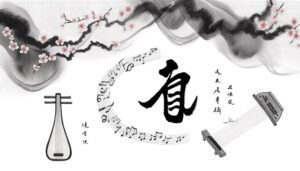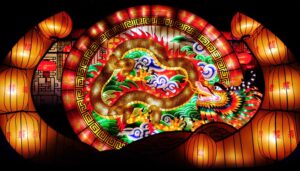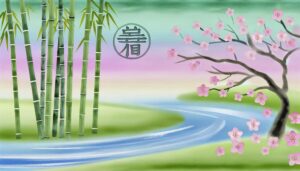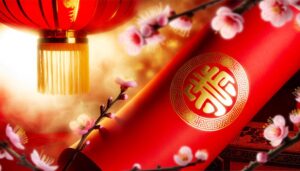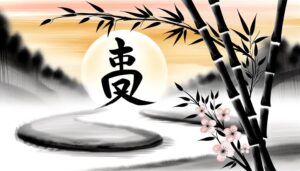What Do the Chinese Symbols for Courage and Soup Represent?
The Chinese characters for courage (勇) and soup (汤) encompass rich cultural and historical layers. The character for courage reflects Confucian ideals of righteousness and moral integrity, deeply embedded in Chinese philosophical thought and heroic narratives.
Similarly, the symbol for soup holds deep cultural connotations, emphasizing nourishment, unity, and well-being. In Chinese society, soup is not merely a dish but a medium for promoting health and fostering social bonds.
Understanding the intricate symbolism behind these characters offers insights into the values and principles that shape Chinese culture and daily life, revealing a fascinating tapestry of tradition and meaning.
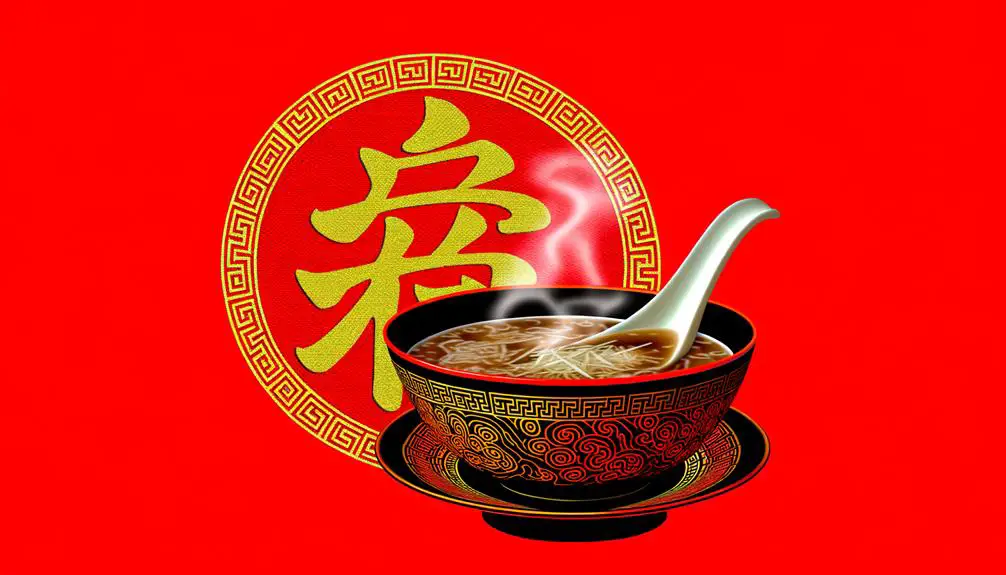
Key Takeaways
- The Chinese character for courage is 勇, symbolizing personal bravery and moral integrity.
- The Chinese character for soup is 湯, representing unity, health, and well-being.
- 勇 reflects Confucian ideals of righteousness and ethical conduct.
- 湯 embodies cultural values of health, social bonds, and familial care.
- Both symbols highlight significant aspects of Chinese culture, from heroism to culinary traditions.
Meaning of Courage (勇)
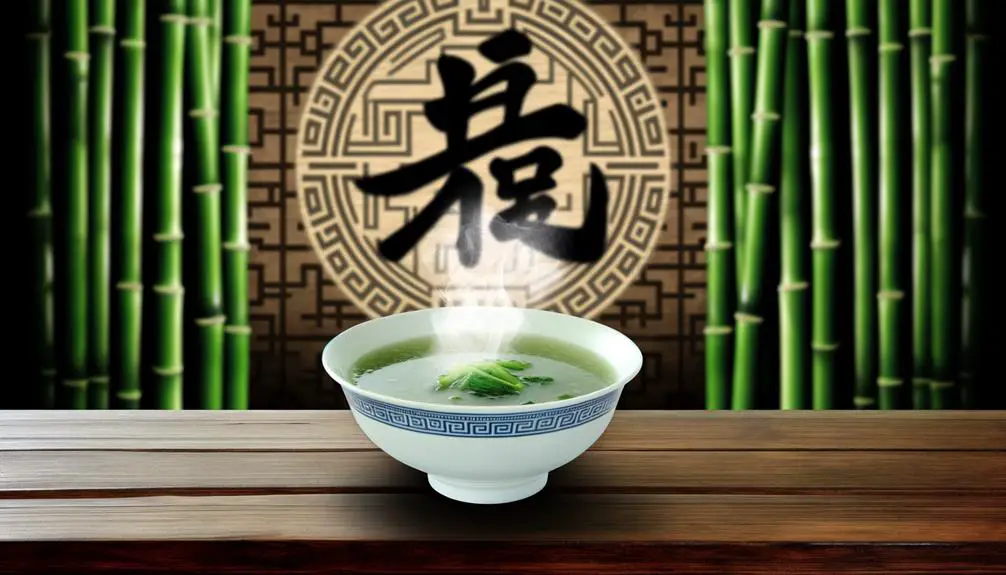
The Chinese character for courage (勇), pronounced 'yǒng,' embodies a rich tapestry of cultural significance and historical depth, symbolizing bravery, resilience, and the steadfastness required to face adversity.
Rooted deeply in East Asian philosophies, 'yǒng' transcends mere physical valor to encompass moral and psychological fortitude. It reflects Confucian ideals of righteousness and the noble path, where true courage is aligned with ethical conduct and societal harmony.
Ethnographically, 'yǒng' is integral in traditional Chinese narratives, serving as an archetype for heroes and common folk alike.
The character's construction, featuring a combination of strength (力) and progress (甬), underscores an enduring mindset that valor and progress are inextricably linked, forming the bedrock of communal and individual perseverance.
Historical Context of Courage
Tracing the historical context of courage in Chinese culture reveals its profound roots in ancient philosophies, dynastic histories, and folkloric traditions.
Courage (勇), integral to Confucianism, is often linked with the virtues of righteousness and integrity. It is celebrated in the heroic tales of the Three Kingdoms period, where warriors exemplified valor.
The Daoist perspective, contrastingly, views courage in alignment with natural harmony and inner strength, valuing wisdom over brute force.
Folklore, such as the legend of Hua Mulan, immortalizes courage through narratives of self-sacrifice and national loyalty.
The confluence of these elements—philosophical doctrines, historical exemplars, and cultural myths—cultivates a multifaceted understanding of courage that permeates Chinese ethos and identity.
Cultural Significance of 勇
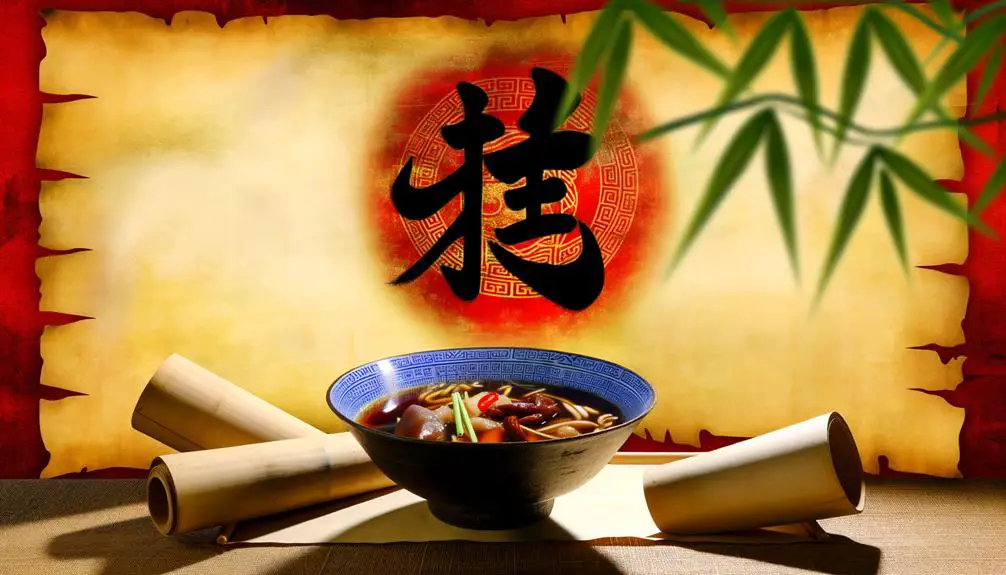
Courage (勇) holds a pivotal role in Chinese culture, symbolizing not only personal bravery but also moral fortitude and societal responsibility. It is deeply embedded in Confucianism, emphasizing the importance of standing up for righteousness. The character 勇 is seen in various traditional narratives and folklore, where heroes display unwavering bravery. It also manifests in daily life, guiding individuals to act ethically and with integrity.
| Aspect | Description | Example |
|---|---|---|
| Personal Bravery | Overcoming fear in challenging situations | Legends of warriors and historical figures |
| Moral Fortitude | Upholding ethical principles | Confucian texts emphasizing virtue and righteousness |
| Societal Responsibility | Contributing to the greater good of society | Public service and community leadership |
This holistic view of courage underscores its enduring relevance in Chinese society.
Modern Interpretations of 勇
In contemporary contexts, the symbol 勇 has transcended its traditional boundaries, reflecting an evolving cultural significance that resonates with modern values.
Contemporary artistic representations often reinterpret this character, integrating it into various forms of visual and performative arts to highlight themes of resilience and personal empowerment.
Additionally, the symbol's presence in popular media underscores its enduring relevance, serving as a potent emblem of courage in storytelling and branding.
Evolving Cultural Significance
The modern interpretations of the Chinese symbol 勇 (yǒng), which signifies courage, have evolved greatly, reflecting broader shifts in societal values and cultural narratives within contemporary Chinese society.
Traditionally associated with martial valor and heroic deeds, 勇 now encompasses a more nuanced understanding. In urban and digital contexts, it symbolizes everyday acts of bravery, such as standing up for social justice or pursuing non-conventional careers.
This evolution mirrors China's rapid modernization and increasing global interconnectedness, where courage is redefined to include mental resilience and moral fortitude. The symbol's adaptability highlights the dynamic interplay between historical heritage and present-day cultural currents, offering insights into how contemporary Chinese individuals navigate their identities amidst changing sociopolitical landscapes.
Contemporary Artistic Representations
Building on the evolving cultural significance of 勇, contemporary artistic representations offer a vivid canvas where modern interpretations of courage are visually and symbolically explored. Artists employ various mediums, from digital art to traditional calligraphy, to reinterpret 勇 within today's context. These works reflect diverse perspectives, blending historical reverence with contemporary issues.
- Digital Art: By incorporating 勇 into virtual landscapes, artists highlight the intersection of courage with technological advancements and cyber-culture.
- Street Art: Murals and graffiti featuring 勇 transform urban spaces, symbolizing societal resilience and communal bravery in public forums.
- Calligraphy: Modern calligraphers tweak traditional strokes, merging old techniques with new styles to express evolving notions of inner strength and valor.
Such artistic endeavors offer a rich, multi-dimensional view of courage in contemporary society.
Symbolism in Popular Media
Symbolism in popular media provides a dynamic platform through which modern interpretations of 勇 (勇) are explored and communicated, reflecting the evolving cultural narratives and societal values surrounding the concept of courage.
In contemporary films, television shows, and digital content, 勇 is frequently depicted through characters who confront personal and societal challenges, embodying both traditional and progressive understandings of bravery.
Ethnographically, the portrayal of 勇 in media often resonates with collective experiences, such as overcoming adversity and advocating for justice. This symbol's integration into storytelling not only offers a lens into the shifting paradigms of courage but also serves as a cultural bridge, connecting audiences to a shared human experience while celebrating the unique nuances of Chinese heritage.
The Symbolism of Soup (汤)
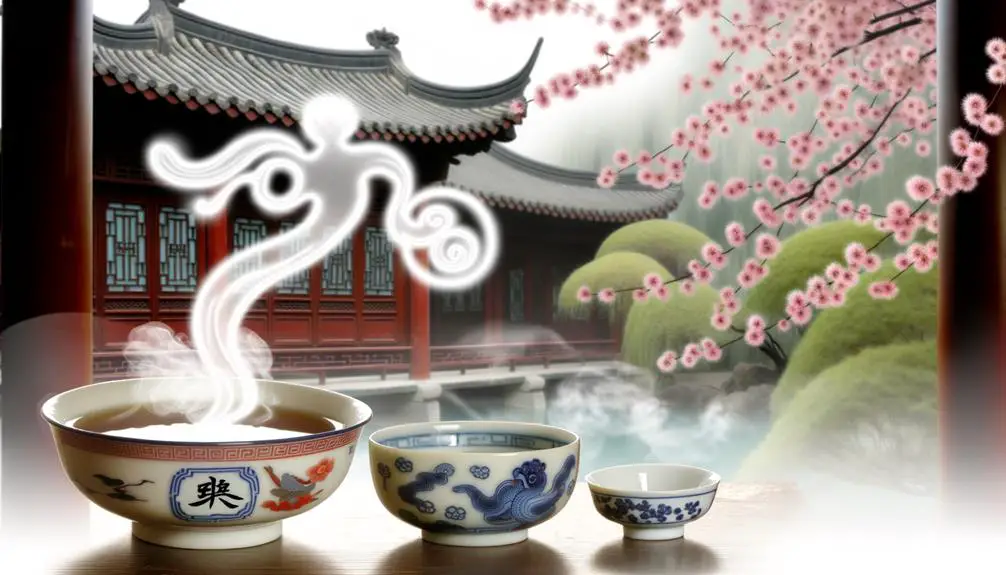
The symbol 湯 (tāng) for soup carries profound cultural significance in Chinese society, where it is often seen as a nourishing and communal dish.
Integral to Chinese cuisine, soup not only complements meals but also embodies a rich tradition of health-promoting ingredients, reflecting ancient culinary wisdom.
Examining the role of soup in daily life offers insights into its enduring importance in fostering physical well-being and social bonds within Chinese communities.
Cultural Significance of Soup
Within Chinese culture, soup (汤) holds profound symbolic meaning, often representing nourishment, comfort, and communal harmony. This cultural artifact transcends its culinary role, embedding itself deeply within the social and familial fabric.
Soup's significance is multi-faceted and can be understood through its role in traditional practices and societal values.
- Nourishment: Soup is seen as a source of essential sustenance, embodying the essence of health and well-being, often prescribed in traditional Chinese medicine.
- Comfort: It provides psychological solace, reflecting the warmth and care of a home-cooked meal, especially during cold seasons or times of illness.
- Communal Harmony: Shared among family and friends, soup acts as a bonding agent, reinforcing social ties and collective identity.
Understanding these aspects offers a window into the cultural depth of this seemingly simple dish.
Soup in Chinese Cuisine
In the world of Chinese cuisine, soup (汤) not only serves as a staple dish but also embodies a rich tapestry of symbolic meanings that reflect the intricate interplay between food and cultural identity.
Integral to familial gatherings and ceremonial feasts, soup often symbolizes unity and togetherness. The act of sharing soup is deeply embedded in social rituals, reinforcing kinship ties and communal harmony.
Additionally, specific soups hold unique meanings; for instance, fish soup signifies prosperity, while lotus seed soup represents fertility and purity. These interpretations are rooted in historical traditions and linguistic homophones, where the pronunciation of ingredients mirrors auspicious words.
As a result, soup in Chinese cuisine transcends mere sustenance, becoming a vessel for cultural expression and continuity.
Health Benefits of Soup
Renowned for its profound cultural symbolism, soup (汤) in Chinese cuisine is also celebrated for its numerous health benefits, which are meticulously crafted through centuries-old recipes and traditional medicinal knowledge. This time-honored practice integrates diverse ingredients to enhance well-being, reflecting a deep understanding of nutritional synergy and balance.
- Immune Support: Herbal soups often incorporate ingredients like ginseng and goji berries, known to boost the immune system and fortify the body against illness.
- Digestive Aid: Broths and soups are gentle on the digestive system, aiding in nutrient absorption and promoting gut health.
- Detoxification: Ingredients like lotus root and mung beans are traditionally used for their detoxifying properties, helping to cleanse the body of impurities.
These elements underscore the holistic approach embedded in Chinese culinary traditions.
Soup in Chinese Cuisine
Often integral to Chinese culinary traditions, soup embodies a rich tapestry of regional flavors and ingredients, reflecting the diverse cultural and historical contexts of various Chinese provinces.
In northern China, hearty broths with robust meats like lamb and beef cater to the cold climate, while southern regions favor lighter, more delicate soups featuring seafood and a variety of fresh vegetables.
The ethnographic significance of soup in Chinese culture extends beyond nutrition; it serves as a symbol of familial unity and hospitality. Ritualistic in nature, soups are often prepared with meticulous attention to traditional techniques, blending medicinal herbs to enhance both flavor and health benefits.
Therefore, soup in Chinese cuisine is a harmonious blend of gastronomy, tradition, and cultural expression.
Traditional Soup Recipes
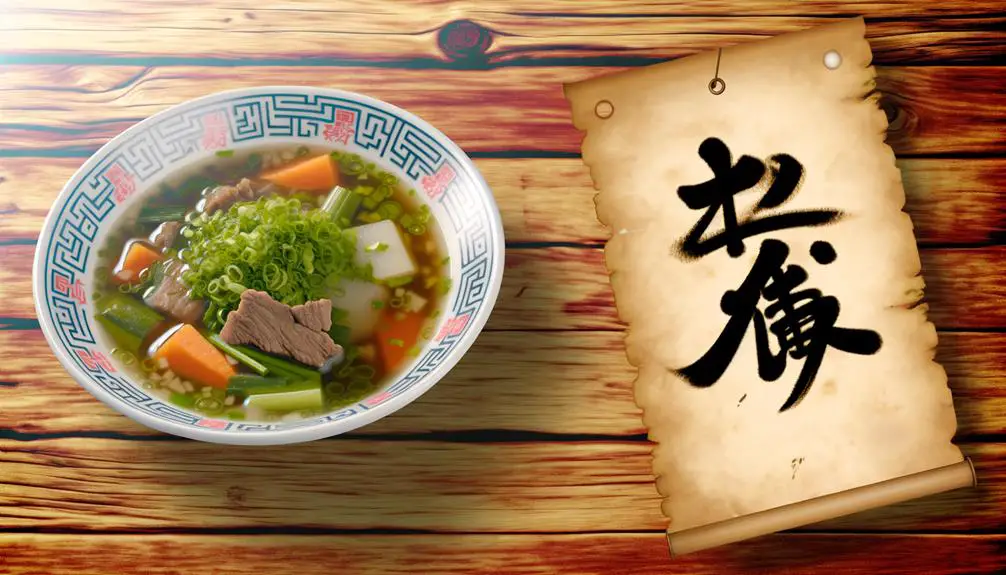
Among the myriad traditional Chinese soup recipes, a few stand out for their deep cultural significance and meticulous preparation methods that have been passed down through generations. These soups are not merely culinary delights but are imbued with historical and ethnographic importance.
- Buddha Jumps Over the Wall: This luxurious soup, featuring ingredients like abalone and shark fin, is a tribute to the opulence and sophistication of Fujian cuisine.
- Herbal Chicken Soup: Often used in traditional Chinese medicine, this soup incorporates herbs like ginseng and goji berries, symbolizing health and essentiality.
- West Lake Beef Soup: Named after the famous West Lake in Hangzhou, this soup's delicate flavors and aesthetics reflect the region's cultural and artistic heritage.
Each recipe is a narrative of regional identity and ancestral sagacity.
Soup as Comfort Food
While traditional Chinese soups carry the weight of historical and cultural significance, their role as comfort food in contemporary households highlights their enduring emotional resonance and universal appeal.
These soups, such as the nourishing chicken and ginseng or the soothing eight-treasure congee, serve as more than mere sustenance. They embody familial love and care, often prepared meticulously during times of illness or distress.
The communal act of sharing a hot bowl fosters a sense of belonging and emotional warmth, reflecting deep-rooted cultural values of family and togetherness.
Ethnographically, these practices underscore how culinary traditions adapt yet persist, bridging generational gaps and providing continuity in the ever-evolving landscape of modern Chinese life.
Courage in Everyday Life
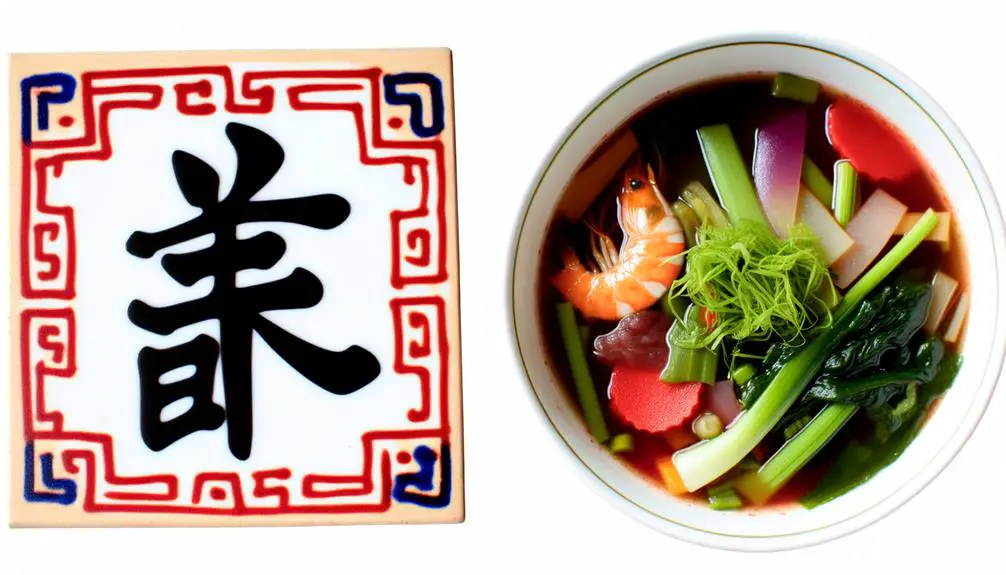
In the context of everyday life, the Chinese concept of courage transcends mere physical bravery to encompass the resilience required to face daily challenges and build inner strength.
This cultural perspective is deeply rooted in a collective ethos that values persistence and emotional fortitude, as reflected in traditional narratives and communal practices.
Facing Daily Challenges
Understanding the intricacies of daily life in modern Chinese society often requires a profound grasp of courage, which is deeply entrenched in cultural traditions and historical narratives. Courage manifests in various facets of everyday life, enabling individuals to navigate challenges with resilience and fortitude.
Daily challenges in Chinese society can be seen through the lens of historical perseverance and cultural values such as:
- Family Obligations: Balancing familial duties with personal aspirations requires immense emotional strength.
- Workplace Pressures: Maintaining harmony and achieving success in a competitive environment demands a steadfast spirit.
- Social Expectations: Adhering to societal norms while pursuing individual goals often necessitates a courageous heart.
Each of these aspects highlights how courage is woven into the fabric of daily life, reflecting a rich cultural heritage and shared human experience.
Building Inner Strength
Cultivating inner strength within the context of Chinese society involves a deep engagement with cultural practices and philosophical teachings that have been passed down through generations. Central to this is the concept of 'Ren,' a Confucian virtue emphasizing humaneness and moral integrity.
Through daily rituals such as Tai Chi and mindfulness meditation, individuals internalize resilience. The practice of calligraphy, viewed as a meditative art, reinforces patience and focus. Additionally, the symbolic representation of courage—often depicted as a tiger—serves as a cultural touchstone, reminding individuals of their inner fortitude.
Ethnographic studies reveal that family narratives and community support systems also play pivotal roles, reinforcing collective values and personal tenacity essential for maneuvering life's adversities.
Connecting Courage and Soup
Exploring the cultural tapestry of China reveals a fascinating linkage between the concept of courage, represented by the character 勇 (yǒng), and the comforting essence of soup, both of which play pivotal roles in the societal and individual spheres. This relationship, deeply embedded in Chinese culture, underscores the holistic approach to well-being and resilience.
- Symbolic Nourishment: Soup is seen as a source of physical and emotional sustenance, mirroring the internal fortitude signified by 勇.
- Rituals and Practices: Traditional Chinese medicine often includes soups that are believed to bolster courage and vitality.
- Communal Bonds: Sharing soup in a communal setting reinforces social bonds and collective courage, essential for facing adversities together.
These elements illustrate a profound interconnection between nourishment and bravery.
Lessons From Chinese Culture
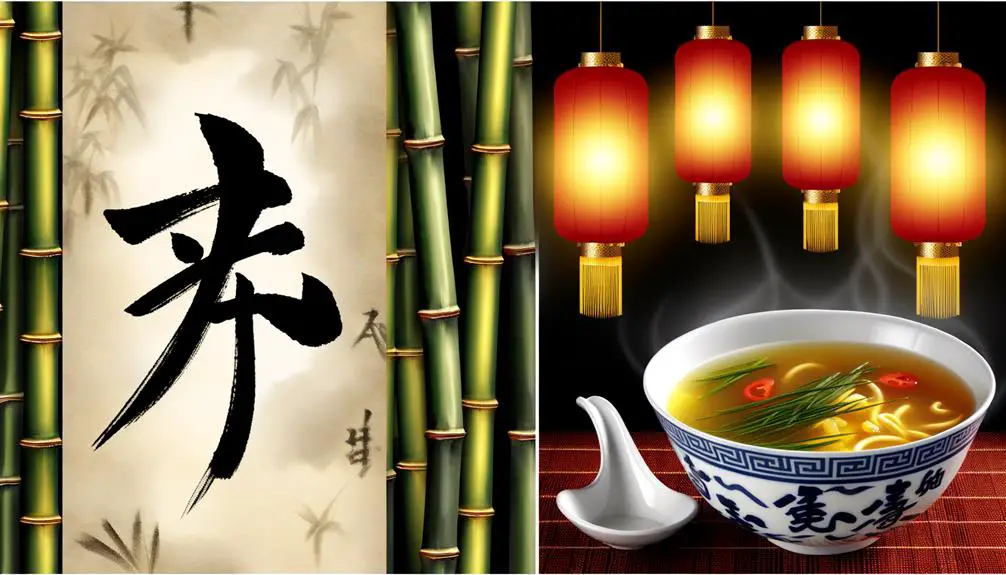
Examining the intricate interplay between courage and nourishment within Chinese culture provides invaluable insights into broader life philosophies and practices that emphasize resilience, community, and holistic well-being.
Courage (勇, yǒng) and the communal act of sharing soup symbolize not just personal strength but collective support. In traditional Chinese society, soup (汤, tāng) often serves as a medium for families to bond, reflecting the cultural importance of interdependence.
Ethnographic studies reveal that these practices are deeply embedded in daily life, promoting not only physical health but also emotional and social stability. The convergence of courage and nourishment underscores a holistic approach to well-being, where mental fortitude and communal care are interwoven, highlighting the enduring values of Chinese cultural heritage.
Conclusion
The intricate tapestry of Chinese culture weaves courage (勇) and soup (汤) into a profound narrative of resilience and comfort.
Courage stands as a historical pillar, deeply embedded in cultural ethos, while soup symbolizes nourishment and solace.
The confluence of these elements underscores a holistic approach to life's challenges, emphasizing inner strength and communal support.
This duality reflects a nuanced understanding of human experience, offering timeless lessons on the symbiotic relationship between fortitude and sustenance.

